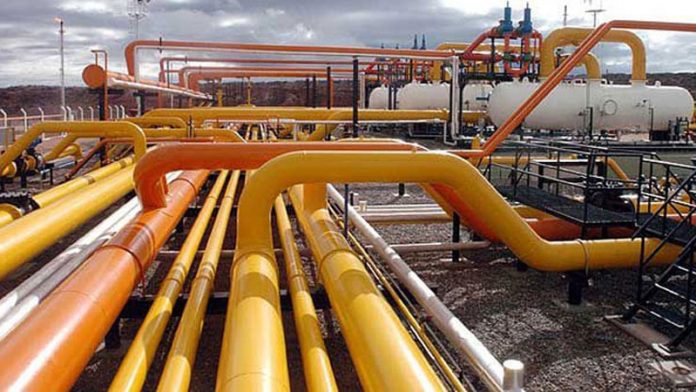The CNG industry on Tuesday unveiled a plan of saving $2.1 billion worth fuel import bill per annum and 50 percent reduction in public transport fares by providing cheap gas for motor vehicles if the government gives go ahead to the private sector to import LNG.
Ghiyas Abdullah Paracha, Group Leader All Pakistan CNG Association (APCNGA) during a media briefing said foreign remittance worth approximately $2.1 billion dollar per annum can be saved under the head fuel import bill while a 50pc cut in public transport fares is also possible only if the government allows Liquefied Natural Gas (LNG) import by the private sector for the CNG industry. Similarly, there would be 53 percent cheaper LNG at CNG stations even if the government withdraws all subsidies on petrol. Furthermore, LNG imports by the private sector would also help reduce the circular debt that crosses Rs2,000 billion in the energy sector.
The consumers had paid Rs16 billion during the last five years on account of capacity payments during the last five years to the Gas Port LNG terminal which has been running on average 70 percent capacity.
Gas Port has an LNG terminal with 750 mmcfd gas whereas the government has 600 MM LNG allocation whereas it has 150 mmcfd capacity in hand but government companies had made it impossible to utilize this capacity.
These revelations were made by Ghiyas Abdullah Paracha, Group Leader All Pakistan CNG Association (APCNGA) during a media briefing which was held on Tuesday.
Paracha said he wanted to present this plan before the incumbent government to put the country’s economy on track, save the foreign exchange reserves by approximately upto $2.1 billion dollar annually under the head fuel import bill and to provide massive relief to the general public in the form of 50 percent cut in the public transport fares, creating job opportunities and minimizing the environment pollution by ensuring gigantic reduction in the carbon emissions with the use CNG as a fuel for motor vehicles. The government should allocate at least 100 MMCFD gas to the CNG sector till the commencement, said Ghiyas Abdullah Paracha.
“We can provide 53 percent cheaper gas on CNG stations for public transport if compare the prevailing petrol price with the start of LNG import by private sector,” said Ghiyas Abdullah Paracha, adding, “ Revival/expansion of the CNG sector can generate thousands of new employment/job opportunities while the use of CNG as an alternative fuel for motor vehicles is equivalent to having an environmental benefit of 152.63 million trees per annum.”
Ghiyas Abdullah Paracha also said that CNG is still cheaper than prevailing petrol price while its price will be cheaper than petrol price if the private sector is allowed to import LNG for the CNG sector of the country.
According to Ghiyas Paracha, at present the CNG is 10.4 percent cheaper than the prevailing price of gasoline in the country while the government is giving subsidies in petrol price and have fixed the petroleum levy (PL) and General Sales Tax (GST) at zero level. He also said if the government allows the private sector to import LNG for the CNG sector then approximately $2.135 billion (Rs419.87 billion) can be saved with import of 300 Million Cubic Feet per Day (MMCFD) LNG to the country and CNG can be cheaper by 18.631% than the current gasoline price.
“General public can find significant 50 percent relief in fares with the use of CNG as a fuel in the public transport,” said Ghiyas Paracha.
Quoting finance minister Miftah Ismail’s target of reducing $22 billion dollar during next one year (FY 2022-23) out of the total deficit of $42 billion dollar, the APCNGA Group Leader said that the private sector can be helpful in meeting this target by approximately 10% only if it is allowed to bring LNG for the CNG sector and utilize the unused LNG terminal capacity.
“We assure the government that positive change can be brought within no time if the private sector is given timely support and cooperation by the government,” said Ghiyas Paracha.
Speaking on the occasion, Ghiyas Abdullah Paracha also demanded from the government to grant permission to use the surplus (private) terminal capacity of LNG terminal and authorization for utilising the unused contracted terminal regasification capacity of the LNG terminal. Similarly, all provincial chief secretaries/transport secretaries should be directed to encourage the owners/transporters to convert their public service vehicles to the environment friendly and cheaper CNG fuel and revise the gas allocation priority list in consultation with the stakeholders. Furthermore, support the CNG sector by giving the level playing field for business.
Sharing details of CNG Stations established across the country with an investment of approximately Rs350 billion, Samir Gulzar, the Central Chairman of APCNGA told that total 2300 CNG Stations are established in the country and out of which 1100 CNG Stations are located in Punjab, 600 CNG Stations are situated in Sindh, 575 CNG Stations CNG Stations are operating in Balochistan province. He said approximately 50pc of the total CNG Stations of Punjab Province have suspended their operation due to non-availability of gas. He also said that Rs150 billion investment so far made in developing the CNG kits has been facing serious danger due to closure of CNG Stations and non-availability of gas as a fuel for motor vehicles. He said direct and indirect employment in the CNG sector is 5.1 lakh. Total gas consumption required by the entire CNG sector is 400 Million Cubic Feet per Day, said Samir Gulzar, the Central Chairman of APCNGA.




